|
“OK boomer” began as a response to older people who either refuse to acknowledge modern problems in society or the economy, failing to understand how things have changed, or make negative comments about younger generations doing things differently and having different interests. It is a condescending retort to a group that frequently misrepresents or ignores concerns younger generations raise. Millennials tried for so long to explain using facts and evidence that they don't actually have it that easy and they aren't just lazy, but it became very clear that boomers don't care about facts, evidence, or reality for that matter. So this is what has resulted. We've given up. I feel like "ok boomer" is kind of the equivalent of "wow, you're so horribly wrong, but I don't have the time or the energy to repeatedly explain something to you that you're not going listen to anyway. These traits can be summed up as "boomer mentality," which is a mentality that also includes assuming how life worked well for you should still work for everyone else today. People hate this because reality isn't the same as it was for you in bygone days and your opinions and attitude are inapplicable, outdated, and/or incorrect. "Boomer mentality" is refusing to comprehend how things have changed and/or failing to understand the reality of what many people live and experience and why the simple solutions that worked for you, don't work for everyone else. "OK Boomer" is also often used as a criticism from people believing that many of todays problems were created or exacerbated by boomer leadership such as climate change, high housing costs from bad zoning, NIMBY actions, and other factors, the massive federal deficit from Boomer politicians, increasing college costs under boomer administrations, and job market complications when applying for jobs, especially entry level positions. Here is what I think started this trend: the middle class is shrinking because of high college and housing costs being up dramatically compared to what they used to be, childcare is unaffordable for many, meaning someone HAS to stay home with the kids even though they need more income to live comfortably, insurance rates increase, wages are not high enough in general to keep up with these rising costs of living, and the amount of disposable income the middle class have is shrinking and killing consumer demand, leading to further consolidation as businesses have less customers. People don't have the spending money to shop like we used to. It's all going to just living expenses and one nice thing. Comparing the cost of living to 50 years ago, life is much more financially difficult. People aren't starting as many businesses either because the startup costs and real estate costs are prohibitively high. Even the poverty line hasn't kept up with inflation. One of the biggest problems with solving poverty in America is how poverty is calculated. When poverty was first calculated, economists discovered that the average American spends 1/3 of their budget on food. So they took the amount required to pay for basic food, tripled it, and said "this is the line where you feasibly can't live on". The problem is that food prices have not increased nearly as much as everything else, such as housing. Nowadays, the average American's food is 1/8 of their budget, but the poverty line is still calculated by tripling the food budget. It's been a few years since I looked, but I think the poverty line for a family of 4 is something like low to mid $20,000s per year. But if you correct for the price change of food and housing, the real poverty line is closer to $60,000s for a family of 4. If you look at the distribution of income, there are a LOT of people who consider themselves middle or lower middle class who would have been under the poverty line back in the 50s if the cost of living was compared. Some say our quality of life is still much better today though because of the advancements in technology. For things like healthcare and some other developments, yeah I'm pleased with that; but for everything else the costs and stress are difficult. Instead of being able to take it easy, we have to work to be able to afford and upkeep the new technology. We're running on a treadmill that is now faster, but with a show to watch on screen or virtual reality and fan as it gets faster. There's also the fact that you need more stuff to function today than before, things like internet, cell service, and a computer are almost mandatory to get by. The only thing i can think of that's cheaper now is some clothing and some consumer electronics due to outsourcing. Now let's look at some comparisons of how costs have changed a lot over the years: Median Price of a home in 1980: $47,200 vs 2020: $391,900 source Median Family income 1980: $21,020 2020: $71,456 source1, source2 Home price as percentage of income 1980: 225% 2020: 548% Median tuition cost of Boise State University resident 1980: $239 2020: $4,030 source1, source2 Tuition price as percentage of income 1980: 1.14% 2020: 5.64% THIS is what's making people mad. THIS is what makes so many turn from capitalism to government involvement and "socialism" policies. They're frustrated with how much it costs to live compared to what it used to be. This is also a major reason for the hate for Boomers and those that think people just aren't trying hard if they aren't financially succeeding like they did. In their younger days, it seems like you really did have to just lift a finger anywhere and it could provide a comfortable life and career pathway. They seemed to have it so easy by comparison! Now, I do understand that there's never NOT been a poor class or people, even in those days, so I don't truly know how it was, but there was definitely a much bigger middle class group of society that thrived back then. 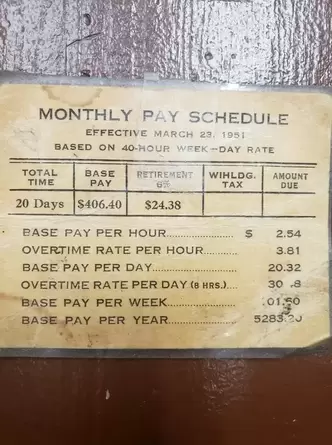 This picture was shared online titled, "My Dad Found This In An Old Locker At His Work." It's a monthly pay schedule from 1951, most likely from a union electrician worker according to the original poster, and commenters ran wild with it by first comparing the dollar amounts to what today's equivalent would be. Taking it a step further, people started commenting about what those wages would get you back then. The pay was determined to be the equivalent of about $27/hr today. An average house back then ranged from $8k to $15k ($91,600-$171,750 toady), cars typically cost around $1,500-$3,000 ($17,175-$34,400 today), and food items averaged around 25-60 cents ($3.09-$6.69 today). That monthly salary went MUUUCH farther than the equivalent does today. To further dig into this point that the cost of living differences are humongous, I found a reddit post titled, "Boomer success stories that no one would believe if they happened today." Some of the stories shared here and others I found elsewhere can still be applied to random success stories today, but they seemed to be much more common 50 years ago. Here's a few quick examples of stories shared:
Sometimes the sentiments dig in really far into the despising of boomers, like this rant I found online titled, "BOOMERS ARE SPOILED BRATS." Love it, hate it, here is the dramatic presentation:
The names we collectively chose for the generations really sum it all up. The Silent Generation bore enormous suffering without complaint, the Greatest Generation bled and toiled for the world's freedom, but the Baby Boomers are named for the mere fact that there is an almighty swarm of them. They never earned a better name for themselves. The Silent Generation and the Greatest Generation had to deal with problems that were greater than themselves. They had to put aside their petty desires and squabbles because of events that were too forceful and lengthy to simply ignore. Boomers have had a seat at the great table of plenty and peace for their entire lives. They don't know any other situation. Their parents’ generation fought WWII for them, the single most factor that made the US a world superpower when the rest of the world was destroyed or developing. Their children’s generation provided the cheap labors when they become managers themselves. The worst things that ever happened to them in their lives were things that DIDN'T happen. The Cuban Missile Crisis was a few paltry days of terror that COULD have ended the world, but didn't. Nobody had to work extra hard, nobody had to go hungry, nobody had to sacrifice a fucking thing. They all just waited around and it turned out nobody got nuked. Compared to their parents' and grandparents' woes, it was no crisis at all. Even taking Vietnam into account, less than 4% of the boomer population served there. The other 96% didn't. Boomers of the US are the luckiest, richest generation of any people in human history. Boomers are the last generation to be able to pay for their own college by washing dishes as a part time job. After that, they graduated and became presidents/provosts themselves and made college super expensive to profit off millennials. Boomers are the last generation to be able to support a whole family by having one working adult. Boomers are the last generation to have all the jobs in the US and not get their jobs outsourced to other countries. Boomers are the last generation that you can just “walk in and get a job”. Now we have wonderful AIs that can decide to ghost your resume for reasons you’ll never know and you’d count yourself lucky if you could get 3 interviews after sending out 300 applications. Boomers are the first generation to have the mindset to spend whatever they make during their lifetime, and not seriously consider leaving anything behind for their children. Bye bye generational American homes and estates. Hello suburb cookie cutters! Boomers will probably be the last generation to have reasonable retirement and healthcare. The whole social security system and 401k will be bust after they’re gone. Now, for each struggling millennial couple looking to get a starter home, there’s some boomer “investor” who offers 50k to 200k more in cash just to get another property on his/her portfolio. With all the wealth they accumulated during their lifetime, it’ll be at least a saving grace that they pass it down when they’re gone, right? Wrong. They’ll lose everything on reverse mortgages and healthcare on their deathbed, hoping to extend their boomer experience for a little longer. Not only are they leaving their kids/grandkids nothing, but they are heading to their graves flipping us the bird the entire way. They are the locusts of humanity, eating the prosperity of the world and complaining as they do it. "I had to walk up a hill in the snow both ways," really pales in comparison to not being able to buy a home, build a family, or obtain healthcare. The most stereotypical complaint of the Boomers, was walking to school in nasty weather.
0 Comments
Leave a Reply. |
The main focus of our discussion is about what struggles people face trying to get into or maintain a middle-class life and prepare for a better future. What would help? We discuss jobs, economy, politics, inequality, other life observations, and most importantly, helping people. Get to know us better and join the conversation.
Archives
February 2024
|
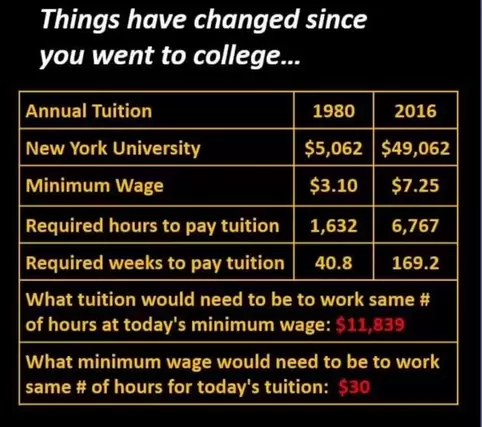
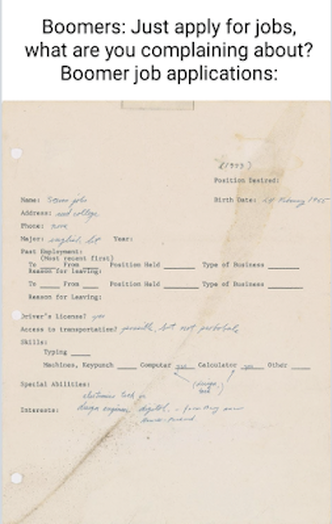
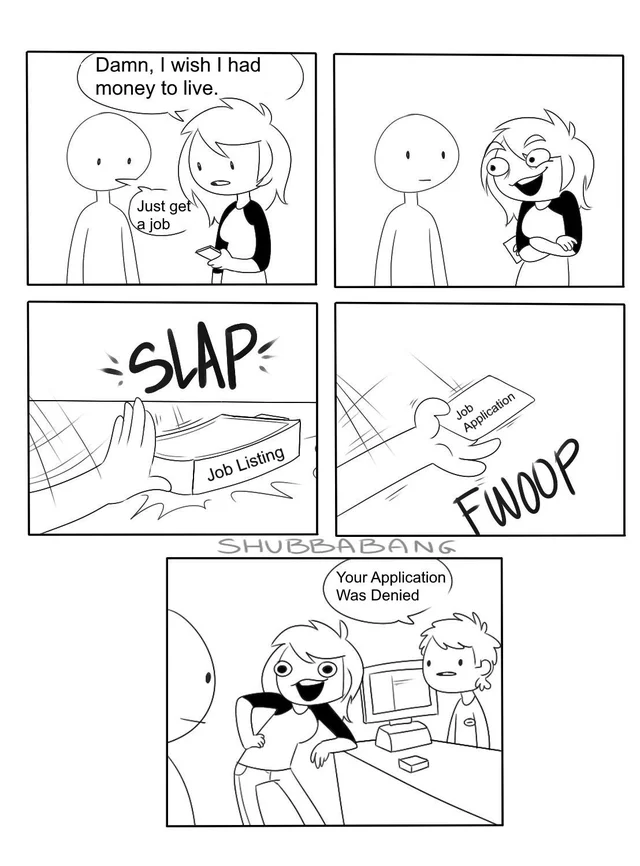
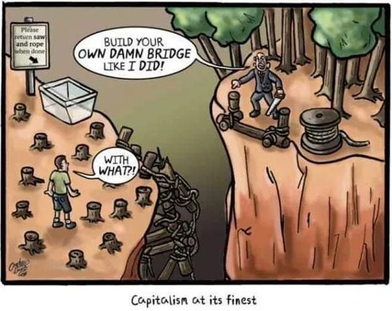
 RSS Feed
RSS Feed